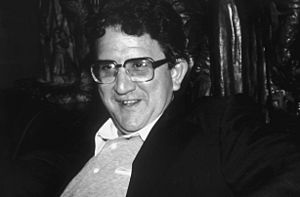Padilla affair facts for kids
Heberto Juan Padilla (born January 20, 1932 – died September 25, 2000) was a famous Cuban poet. He became well-known because of something called the Padilla affair. This happened when he was put in jail for speaking out against the Cuban government.
Heberto Padilla was born in a place called Puerta de Golpe, in Pinar del Río, Cuba. His first book of poems, Las rosas audaces (which means The Audacious Roses), came out in 1949. He had three children from his first marriage: Giselle, Maria, and Carlos. Later, he married another poet, Belkis Cuza Malé, and they had a son named Ernesto.
Even though Padilla first supported the revolution led by Fidel Castro, he started to criticize it openly in the late 1960s. Because of this, he was arrested by the Castro government in 1971.
Contents
The Story Behind the Conflict
Heberto Padilla started to criticize the Cuban government because of how writers were treated. At first, writers in Cuba were very active. They created many cultural groups and published books. One important group was Casa de las Américas. They also published a magazine called Lunes de Revolución.
However, government officials began to control art more. They even banned a movie called P.M., which showed nightlife in Cuba. This made writers and the government distrust each other. After this, many writers, including those from Lunes de Revolución, were invited to meetings. There, government leaders accused them of not being truly socialist.
The arguments became very heated. So, Fidel Castro himself stepped in. He explained the government's new rules for art. He said that all kinds of art were allowed, but only if they supported the Revolution in a basic way.
Padilla's Growing Frustration
Padilla became upset with the government's increasing control over art and culture. In 1968, he wrote a strong review in a magazine called El Caimán Barbudo. He criticized a novel by Lisandro Otero, who was a high-ranking cultural official. Padilla called Otero's book bad. Instead, he praised another novel by Guillermo Cabrera Infante, calling it brilliant.
This was a big deal because Cabrera Infante had openly criticized the Cuban Revolution. By praising him, Padilla seemed to be siding with someone against the government. After this, the people who ran El Caimán Barbudo magazine were fired. Padilla also lost his job at Granma, a government newspaper.
A Controversial Book
Padilla's frustration grew even more. In 1968, the Cuban Union of Writers and Artists (UNEAC) gave an award to Padilla's book of poems, Fuera del juego. This meant the book could be published.
But before it was published, many people in UNEAC strongly criticized the book. They said it was against the Revolution. The poems in the book showed doubt about the Revolution. For example, in the poem also called Fuera del juego, Padilla described the difference between a good revolutionary and a bad one. Even though the book was critical, Padilla said it was meant to help the Revolution avoid becoming too strict or military-like.
The decision to publish the book was kept. But it was printed with a warning that it was politically controversial. Still, the criticism of Padilla's work did not stop. Articles appeared in Verde Olivo, a military magazine. These articles pushed for even stricter rules for art. They said that Cuban writers not only had to support the Revolution, but also had to help it by using their writing as a "weapon" against anything that might slow it down.
The "Padilla Affair"
Why He Was Arrested
As the Cuban government's rules for art became stricter, they watched writers more closely. Writers were punished for even small differences from the government's ideas. So, on March 20, 1971, Heberto Padilla was arrested and put in jail. The reason was his book, Fuera del juego.
One of the strange charges against his book was about his idea of history. Padilla had described time as a circle. This was seen as going against the Revolution. The UNEAC officially said that Padilla showed an "anti-historical attitude" by focusing on individuals instead of the group. They also said his idea of time as a repeating circle, instead of a forward-moving line, was wrong.
Life After Prison
After his release, Heberto Padilla left Cuba. He lived in different cities like New York, Washington, D.C., and Madrid. He finally settled in Princeton, NJ. Padilla worked as a Fellow at the Woodrow Wilson International Center for Scholars.
Many of his books were published, including his poems, a novel called En mi jardín pastan los héroes (which means Heroes Are Grazing in My Garden), and a memoir called La mala memoria (translated as Self-Portrait of the Other).
Heberto Padilla was a special scholar at Columbus State University in Georgia from 1999 to 2000. He passed away on September 25, 2000, while he was teaching at Auburn University in Alabama.
His Books and Poems
Poetry
- Las rosas audaces, 1949
- El justo tiempo humano, 1962
- La hora, Cuadernos de Poesía 10 (Sets of Poems 10), La Tertulia, La Habana, 1964
- Fuera del juego, 1968
- Provocaciones, 1973
- Poesía y política - Poetry and Politics, bilingual anthology, Playor, Madrid, Georgetown University Cuban series, 1974
- El hombre junto al mar, Seix Barral, Barcelona, 1981
- Un puente, una casa de piedra, 1998
- Puerta de Golpe, anthology created by Belkis Cuza Malé, Linden Lane Press, 2013
- Una época para hablar, anthology that contains all of Padilla's poetry, Luminarias / Letras Cubanas, 2013
Stories
- El buscavidas, novel, 1963
- En mi jardín pastan los héroes, novel, Editorial Argos Vergara, Barcelona, 1981
- La mala memoria, memoir, Plaza & Janés, Barcelona, 1989 (Eng. translation: Self-portrait of the other 1989)
- Prohibido el gato, political novel written in 1989
See also
 In Spanish: Heberto Padilla para niños
In Spanish: Heberto Padilla para niños


